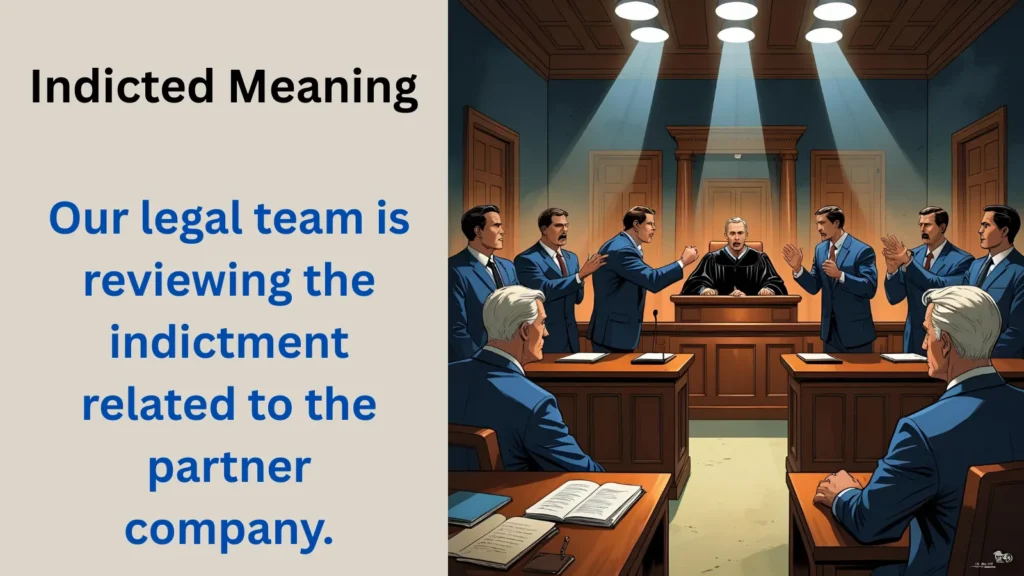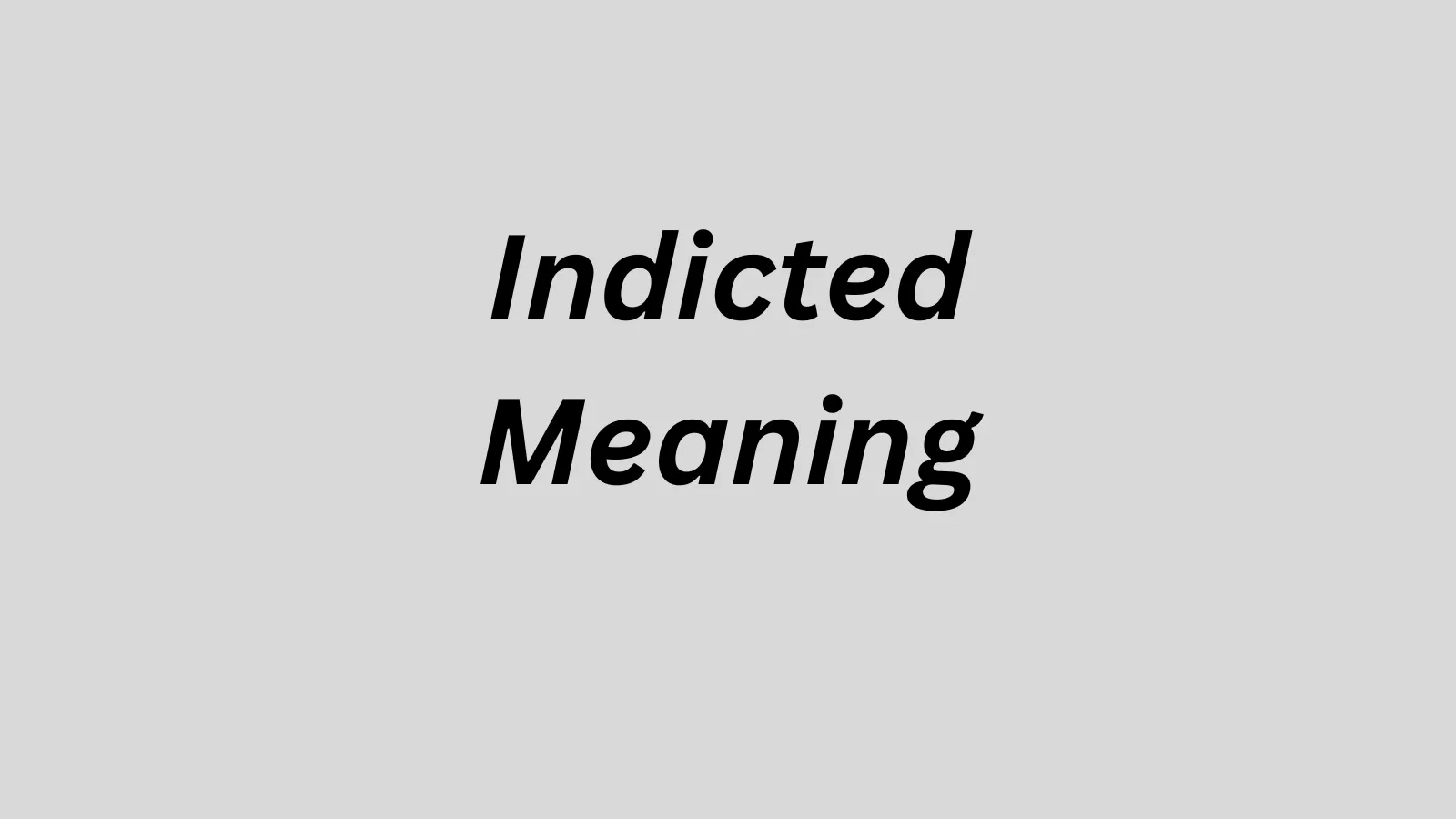If you are curious about indicted meaning, that guide is desiged to help you describe that legal term. Indicted means formally charged with a crime after a legal investigation by a grand jury or authority. In simple terms, if someone is indicted, it means there is enough evidence for them to face criminal charges in court. The indictment itself does not prove guilt — it only begins the formal legal process.
You’ll often see this word used in news headlines about politicians, celebrities, or business figures facing serious allegations. For example:
- “The senator was indicted on charges of corruption.”
- “Several executives were indicted for financial fraud.”
In this article, we’ll clearly explain what indicted means, how it differs from being arrested or convicted, and provide real-world examples to help you understand its use in both legal and everyday contexts.
What Does “Indicted” Mean?
Indicted refers to the formal accusation that someone has committed a crime, issued by a grand jury after reviewing evidence. It is a key step in the criminal justice process that moves a case toward trial. An indictment outlines the alleged offense but does not determine guilt — that happens later in court.
Example Sentences:
- “After months of investigation, the businessman was indicted for tax evasion.”
- “She was indicted on multiple counts of fraud but pleaded not guilty.”

Key Points to Remember:
- Indicted = officially charged, not yet proven guilty.
- It follows a legal review by a grand jury or prosecutor.
- An indictment starts the formal criminal process, leading to arraignment or trial.
- Related legal terms: accused, charged, arraigned, prosecuted.
Background & History
The word “indict” comes from the Latin word “indictare,” meaning to declare or proclaim. It entered Middle English in the 14th century through Old French.
In the British legal system, and later in American law, “indictment” became a key part of the criminal justice process. In early England, juries reviewed charges through indictments to protect citizens from unfair punishment before putting anyone on trial.
How it has evolved:
- Once a very formal court term, “indicted” is now common in headlines and even on social media.
- Indicted’s meaning is often linked with politicians, celebrities, and white-collar crimes.
Modern Use Example:
- “The CEO was indicted after a six-month investigation.”
- “This is the third indictment in just one year!”
Because of high-profile legal battles and 24/7 news, the term “indicted” has gone from a courtroom term to a buzzword known by nearly everyone.
Usage in Various Contexts
People now use the term “indicted” in various everyday settings, both seriously and humorously, even though it was originally a legal term.
Social Media:
People often use the term sarcastically or for dramatic effect.
- “My cat just knocked over my coffee. She’s indicted in my book.”
- “Officially indicting myself for eating an entire pizza alone.”
Texting or Casual Chat:
Emma: “Did you hear what Alex did?”
Maya: “Yep. We indicted him in the group for ghosting us all week. 😤
Gaming:
Gamers may jokingly accuse teammates.
- “You miss this easy shot—you indict for war crimes! 😂”
News:
- The authorities have indicted three officers in connection with the case.
- “A grand jury indicted the suspect on multiple charges.”
Professional Settings:

- Used when discussing legal or compliance matters.
- “Our legal team is reviewing the indictment related to the partner company.”
The tone shifts based on context—serious in court or news, but often lighthearted in informal settings.
Common Misconceptions & Clarifications
There are several common myths around what “indicted” means:
1. Indicted = Guilty?
False.
Indicted doesn’t mean someone is guilty—it means there’s enough evidence to go to trial.
2. Arrested and Indicted Are the Same?
Not quite.
- Arrest = taken into custody.
- Indicted = formally charged, may or may not involve immediate arrest.
3. Only Criminals Get Indicted?
Not always.
Sometimes, authorities indict people because of mistakes they made or their involvement in corporate actions they didn’t fully understand.
Clarification Example:
Jake: “He was indicted? That means he did it, right?”
Nina: “Not necessarily. A trial decides guilt, not an indictment.”
Similar Terms & Alternatives
There are a few related terms or alternatives people use when talking about criminal accusations:
| Term | Meaning | Used When |
| Charged | An informal term for someone suspected | Regular criminal cases |
| Arrested | Taken into police custody | Beginning of legal action |
| Convicted | Found guilty by a court | After trial |
| Accused | During the trial phase | Used before official charges |
| Prosecuted | Taken to court for a crime | Called to appear in court, not always a criminal |
| Summoned | Called to appear in court, not always criminal | Civil or minor legal issues |
Example:
- Authorities arrested him but didn’t indict him.
- Prosecutors charged her, but the court later found her not guilty.
Knowing the difference between these terms can help avoid confusion in serious discussions or debates.
How to Respond to This Term
When someone mentions an indictment, your response can vary depending on the tone and context.
1. Casual/Funny:
Taylor: “Bro, I just got indicted by my mom for not calling her all week.”
You: “Hope your trial goes well. Need a lawyer? 😂”
2. Serious:
News: “A top executive was indicted for fraud.”
You: “That’s a big deal. The company’s future might be affected.”
3. Professional:
Colleague: “Our business partner was indicted yesterday.”
You: “We should schedule a compliance review because this may affect our contracts.
4. Privacy-Conscious:
Friend: “Did you hear about that indictment?”
You: “Yeah, I saw. Not sure what to make of it, though. Let’s wait for more info.”
Tip: Always match your tone to the situation. Avoid jokes when discussing serious or real-life indictments that involve harm or victims.
Regional or Cultural Differences
Countries like the United States, Canada, and the United Kingdom use the term “indicted” within their Anglo-American legal systems.
- United States
- Canada
- United Kingdom (though it’s less common now)
In other countries, different terms may apply. For example:
- In France, “mise en examen” is used (meaning “under formal investigation”).
- In India, charges are typically filed as part of a “charge sheet.”

Slang Variations:
In online spaces or different English dialects, you might hear:
- “Booked” (India/UK slang) – meaning arrested or formally charged.
- “Nabbed” – informal way of saying someone was caught.
Legal systems may differ, but officials across the world still formally accuse individuals similarly.
Comparison with Similar Terms
Let’s break down the differences between indicted and similar terms.
| Term | Means | Guilt Decided? | By Whom? |
| Indicted | Formally accused via grand jury | No | Grand jury |
| Charged | Formally accused (not always by jury) | No | Prosecutor |
| Arrested | Taken into custody | No | Police |
| Convicted | Proven guilty | Yes | Judge or jury |
| Accused | Suspected or blamed | No | Anyone (informal) |
Understanding these terms helps in following legal proceedings, news, or even online drama without confusion.
Usage in Online Communities & Dating Apps
Interestingly, “indicted” pops up in fun, meme-style formats on Reddit, TikTok, and dating apps like Tinder or Bumble.
Examples:
On Reddit:
“This post is so cursed, OP should be indicted for crimes against humanity.”
On Dating Apps:
Bio: “Indicted by my friends for always being late—but worth the wait 😉”
On TikTok:
A skit about someone sneaking snacks into the theater with the caption:
“Indicted for smuggling popcorn 😂🍿”
These are playful and non-serious uses of the term, often meant to exaggerate harmless behavior in a fun way; consequently, it adds drama or sass to everyday moments.
FAQ: Indicted Meaning
Q: What does indicted mean?
Indicted means that a person has been formally charged with a crime by a grand jury, indicating there is enough evidence to proceed with a criminal trial.
Q: Is being indicted the same as being guilty?
No, being indicted does not mean someone is guilty. It only means there is enough evidence to bring the case to court.
Q: What happens after someone is indicted?
After an indictment, the court usually arraigns the accused, requiring them to appear and hear the charges before entering a plea.
Final Thoughts
Understanding the meaning of indicted helps clarify how the justice system works. Being indicted doesn’t mean someone is guilty — it simply means a formal charge has been made after a legal review of the evidence. It’s the first major step in moving a criminal case toward trial.
In everyday use, the word indicted often appears in news or legal discussions to highlight serious allegations, but it always carries the presumption of innocence until proven guilty.
By knowing this distinction, you can better interpret headlines, court updates, or public statements involving legal cases.

